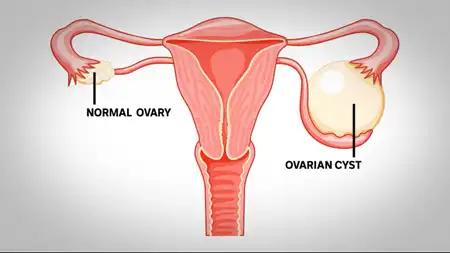
What is an Ovarian Cyst?
An ovarian cyst is a sac filled with fluid that forms inside or on the surface of an ovary. Ovaries are part of the female reproductive system and normally release eggs every month. Sometimes, during this process, small fluid-filled sacs develop, which are called cysts.

Most ovarian cysts are harmless and may disappear naturally within a few weeks or months. However, some cysts may grow larger, cause pain, or create other health issues. Regular monitoring by a doctor ensures whether treatment is required or not.
What are the symptoms of an ovarian cyst?
Many ovarian cysts do not cause any symptoms and are discovered only during routine checkups. When symptoms appear, they may include pelvic pain (dull or sharp, often on one side), bloating, or heaviness in the abdomen. Some women may have irregular menstrual periods, pain during intercourse, or frequent urination due to pressure on the bladder. Sudden severe pain, nausea, or fever may indicate rupture or torsion of the cyst, which is an emergency. Since symptoms often overlap with other conditions, proper diagnosis by a doctor is important.
What causes ovarian cysts?
Ovarian cysts can form due to various reasons, and understanding the cause helps in proper management. Common causes include:
- Hormonal Imbalance: Functional cysts develop during the menstrual cycle when ovulation is irregular. Follicular cysts form when an egg is not released, while corpus luteum cysts develop after ovulation.
- Endometriosis: Women with endometriosis may develop endometriomas or “chocolate cysts,” caused by endometrial tissue growing on the ovary.
- Polycystic Ovarian Syndrome (PCOS): Multiple small cysts develop due to hormonal imbalance, often causing irregular periods and fertility issues.
- Pregnancy: Corpus luteum cysts may form during early pregnancy to support hormonal function.
- Infections or Growths: Pelvic infections or benign growths like dermoid cysts and cystadenomas can also lead to cyst formation.
- Lifestyle Factors: Stress, poor diet, and obesity may indirectly contribute to cyst development through hormonal disruption.
What are the different types of ovarian cysts?
There are several types of ovarian cysts. Functional cysts are the most common, formed during the menstrual cycle, such as follicular cysts and corpus luteum cysts. Dermoid cysts contain tissues like fat, hair, or teeth. Endometriomas, also called “chocolate cysts,” occur due to endometriosis. Cystadenomas are filled with watery or mucus-like fluid and may grow very large.
- Functional Cysts (most common)
-
- Form during the menstrual cycle
- Types:
- Follicular cyst: Follicle doesn’t release an egg
- Corpus luteum cyst: The Sac doesn’t dissolve after egg release
- Usually mild or no symptoms; may cause pelvic discomfort
- Often resolve on their own
- Dermoid Cysts
- Contain tissues like hair, fat, or teeth
- Usually painless; may cause bloating if large
- Surgery if symptomatic or large
- Endometriomas (“Chocolate Cysts”)
- Form due to endometriosis
- It can cause pelvic pain, painful periods, or infertility
- Managed with medication or surgery, depending on severity
- Cystadenomas
- Filled with watery or mucous fluid
- Can grow large and cause abdominal bloating or discomfort
- Surgery may be needed if large or symptomatic
Some cysts are simple and harmless, while others may require treatment depending on their size, type, and symptoms. Doctors usually identify the type of cyst through ultrasound and medical history.
Important: Ultrasound is used to identify the type and size of cysts and to decide the treatment plan.
Who is at risk of developing ovarian cysts?
Women in their reproductive years are most at risk because ovarian cysts are often linked to ovulation. Those with irregular menstrual cycles, hormonal imbalances, or conditions like polycystic ovarian syndrome (PCOS) are more likely to get cysts. Women with endometriosis can develop endometriomas. Pregnant women may also get cysts that support early pregnancy. Though less common, cysts can develop in post-menopausal women, too, and in such cases, careful evaluation is necessary. Overall, being in the childbearing age group increases the chances of having ovarian cysts at some point.
Do hormonal problems cause ovarian cysts?
Yes, hormonal problems are a common cause of ovarian cysts. Normally, hormones regulate egg release during each menstrual cycle. If this process is disrupted, a follicle may not release the egg or may continue to grow, forming a cyst. Women with hormonal conditions such as PCOS are more prone to multiple cysts. Stress, obesity, and thyroid problems may also affect hormone balance and indirectly contribute to cyst formation. Treating underlying hormonal issues often helps reduce the risk of developing new cysts and supports overall reproductive health.
Can stress cause ovarian cysts?
Stress alone does not directly cause ovarian cysts, but it can indirectly play a role. High stress levels can affect hormone balance in the body, which in turn may disturb ovulation. When ovulation is irregular, cysts may form more easily. Additionally, stress often affects lifestyle habits like sleep, diet, and exercise, which may worsen hormonal imbalances. While stress is not the main cause, managing it through relaxation, yoga, meditation, and healthy living can help regulate hormones and may reduce the risk of developing ovarian cysts.
How common are ovarian cysts in women?
Ovarian cysts are very common, especially in women of reproductive age. Most women will develop at least one ovarian cyst in their lifetime, often without even knowing it. These cysts are usually harmless and dissolve on their own within a few menstrual cycles. Only a small percentage of cysts cause noticeable symptoms such as pelvic pain or irregular periods. Women after menopause can also develop cysts, but these require more careful evaluation to rule out other conditions. So, ovarian cysts are a frequent finding but usually not a serious problem.
Can ovarian cysts cause infertility?
Ovarian cysts can sometimes affect fertility, depending on their type and size. Functional cysts usually do not impact a woman’s ability to conceive. However, conditions like endometriomas (from endometriosis) or multiple cysts from PCOS can interfere with ovulation, making it harder to get pregnant. Large cysts may also distort the ovary or fallopian tubes, affecting fertility. Treating the underlying cause, whether hormonal imbalance or endometriosis, can improve chances of conception. Most women with ovarian cysts, especially functional ones, can still conceive naturally without complications.
Can ovarian cysts cause irregular periods?
Yes, ovarian cysts can cause changes in the menstrual cycle. Functional cysts related to ovulation can temporarily delay or alter periods. Women with multiple cysts, such as those with PCOS, often experience irregular or missed periods due to disrupted hormone levels. Endometriomas may also affect cycle regularity. While mild irregularities are common, persistent changes in menstrual flow or timing should be evaluated by a doctor. Proper diagnosis helps identify whether the cyst is causing the issue or if another hormonal or reproductive problem is present.
Which foods are good for ovarian cysts?
A balanced, anti-inflammatory diet supports hormonal health and cyst management. Include:
- Fresh vegetables and fruits for fibre and antioxidants
- Whole grains like oats, quinoa, and brown rice
- Omega-3 rich foods: flaxseeds, walnuts, fish
- Lean protein: eggs, chicken, legumes
- Herbs like turmeric and ginger for inflammation
Avoid processed, sugary, and high-fat foods. Adequate water intake and small, frequent meals help regulate metabolism. A healthy diet combined with medical treatment can support cyst shrinkage, reduce discomfort, and prevent new cyst formation.
Are there natural remedies for ovarian cysts?
Certain natural remedies can help support cyst management and relieve symptoms, but they do not replace medical treatment. These include:
- Warm compresses for pelvic pain
- Herbal teas: ginger, chamomile, or green tea for inflammation
- Anti-inflammatory foods: turmeric, flaxseeds, omega-3-rich foods
- Stress management: meditation, deep breathing, or yoga
These remedies can improve comfort and overall health. Regular checkups and monitoring are essential to ensure cysts shrink naturally or receive proper medical intervention if needed.
Homoeopathic Treatment for Ovarian Cysts
Homoeopathy offers a gentle, individualised approach aimed at treating the underlying cause of ovarian cysts, restoring hormonal balance, and improving reproductive health. Homoeopathy remedies are selected based on specific symptoms, menstrual history, lifestyle, and overall constitution of the patient.
Benefits of Homoeopathy for Ovarian Cysts:
- Reduces the size and recurrence of cysts naturally
- Regulates menstrual cycles
- Relieves pelvic pain, bloating, and discomfort
- Supports fertility and hormonal balance
- Gentle, safe, and without side effects
Commonly Used Homoeopathy Remedies (only under professional guidance):
- Pulsatilla: For ovarian cysts with irregular periods, bloating, and mood swings
- Sepia: For women with hormonal imbalance, menstrual irregularities, and recurring cysts
- Calcarea Carbonica: For women prone to weight gain, fatigue, and multiple cysts
- Lachesis: For cysts with severe pelvic pain and premenstrual discomfort
- Thuja: For dermoid or complex cysts, especially with past surgical history
Homoeopathy treatment is personalised, meaning the remedy is chosen based on each patient’s specific symptoms rather than just the cyst type.
Lifestyle and Home Care for Ovarian Cysts
Along with treatment, homoeopathy encourages lifestyle modifications to support healing:
- Dietary Adjustments:
- Include fresh vegetables, fruits, whole grains, lean proteins, and omega-3-rich foods
- Avoid processed foods, refined sugar, excessive dairy, and trans fats
- Stay hydrated to improve metabolism and reduce bloating
- Exercise and Yoga:
- Moderate exercise and yoga improve blood circulation, reduce stress, and support hormonal balance
- Specific poses like pelvic tilts, butterfly, and cobra help relieve pelvic discomfort
- Stress Management:
- Meditation, breathing exercises, and adequate sleep help regulate hormones and prevent recurrence
- Regular Monitoring:
- Periodic ultrasounds and doctor consultations ensure cysts are shrinking and complications are avoided
Ovarian Cysts and Pregnancy
Most ovarian cysts do not affect fertility or pregnancy. Small functional cysts usually resolve naturally and do not interfere with conception. However, larger cysts or those related to PCOS or endometriosis may require homoeopathy support or medical intervention to improve fertility. Homoeopathy treatment can help regulate cycles, support ovulation, and maintain a healthy reproductive system, enhancing chances of pregnancy.
When to Seek Medical Attention
Immediate medical evaluation is necessary if:
- Severe, sudden pelvic pain occurs
- Nausea, vomiting, or fever accompanies pain
- Abdominal swelling increases rapidly
- Symptoms persist for several menstrual cycles
Early detection and timely homoeopathy or medical care prevent complications like rupture or ovarian torsion.
Why choose Dr. Sanjay’s Homoeopathy for Ovarian Cysts treatment in Lucknow, India?
Dr. Sanjay’s Homoeopathy is a trusted clinic for safe and effective Ovarian Cysts treatment in Lucknow, India. With years of expertise, Dr. Sanjay Singh is one of the best ovarian cyst doctors in Lucknow, India, and provides specialised homoeopathy treatment that helps manage irregular periods, pelvic pain, bloating, hormonal imbalance, and fertility concerns naturally without side effects. As a leading homoeopathic doctor for Ovarian Cysts in Lucknow, he follows international treatment standards and offers personalised care that focuses on shrinking cysts, regulating menstrual cycles, and restoring hormonal balance. Patients choose Dr. Sanjay’s Homoeopathy for its holistic healing, long-lasting relief, and compassionate approach in managing women’s health conditions like Ovarian Cysts.


